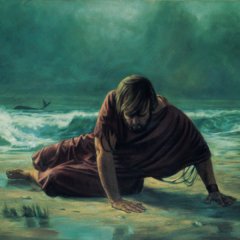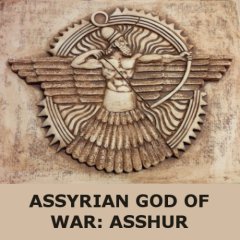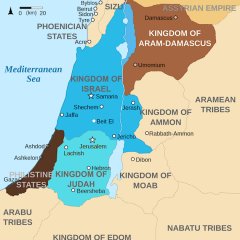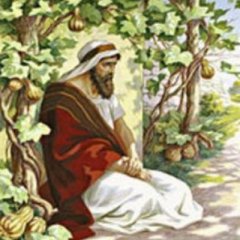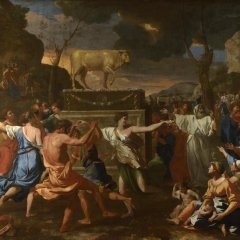BIBLE STUDY HOME
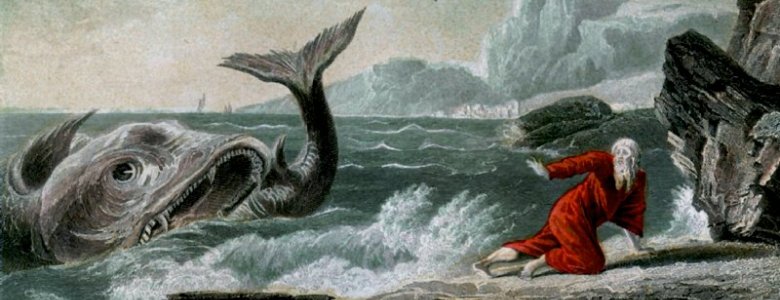
THE BOOK OF JONAH
Below are the five lessons in my Bible Study of the Book of Jonah. In Lesson-1 (Jonah 1-2), God calls Jonah to go to Ninevah and preach, but Jonah tries to run away from God. In Lesson-2, (Jonah 3:1-10), Jonah heeds God’s call and goes ot Ninevah. In Lesson-3, (Jonah 4:1-5), we see Jonah’s reaction to God saving the Ninevites, how this affected the Northern Kingdom, and what finally happened to Nineveh. In Lesson-4, (Jonah 4:6-11), we see Jonah dealing with further discomforts and how he deals with it all. In Lesson-5, we cover the background to explain the reason for Jonah’s missionary expedition to Ninevah.
LESSON 1
The story of Jonah and the whale is a well-known Bible story, especially in children’s storybooks because it lends to great illustrations of a big whale. There is much more to the story than Jonah being swallowed by a whale. The Book of Jonah is about obedience when God calls. It’s about God’s mercy and God’s judgment.
Jonah lived in Gath-hepher, which is in the Northern Kingdom near the town of Nazareth. Nineveh is the capital city of Assyria, which is north and east of Israel. The date is about 771 BC. Following the death of Solomon, the nation of Israel was divided into the Southern Kingdom and the Northern Kingdom. The Assyrian people are extremely wicked and cruel especially to their captives. They would hook a chain into their tongues and chain them together to march captives back to Assyria. Those they killed, they cut up their body parts and piled them into a pile to frighten those that are left. The Assyrians were known throughout that part of the world as being extremely cruel.
[Jonah 1:1-2] The word of the Lord came to Jonah son of Amittai; “Go to the great city of Nineveh and preach against it, because its wickedness has come up before me.”
The people of the Northern Kingdom of Israel worshiped other gods, while its leaders cheated and robbed the people. Assyria raided the countryside, stealing cattle and grain as well as killing people and taking captives. God’s judgment was about to fall on the Northern Kingdom. But God, being a loving and merciful God decided to give them another fifty years to repent. So we have God’s call to the prophet Jonah to go and preach to the Assyrians in their Capital city of Ninevah, to call them to repent of their wicked ways and give the Northern Kingdom time to repent of their sins so that God would not destroy the kingdom. Well, now Jonah knew about the Assyrians, how cruel they were, how they treated their captives, the mean and wicked things they did so Jonah decided it was wiser to protect his own neck than to follow God’s call. Instead of going north and east to Ninevah, Jonah traveled west trying to get as far away from the Northern Kingdom and Assyria as he could go.
[Jonah 1:3] But Jonah ran away from the Lord and headed for Tarshish. He went down to Joppa, where he found a ship bound for that port. After paying the fare, he went aboard and sailed for Tarshish to flee from the Lord.
Jonah ran away from the Lord and headed for Tarshish. He went down to Joppa, where he found a ship bound for that port. After paying the fare, he went aboard and sailed for Tarshish to flee from the Lord. We don’t know for sure where Tarshish was but it is believed to be in Southern Spain. Jonah got on a boat in Joppa on the coast of Israel headed for Tarshish.
[Jonah 1:4-16] Then the Lord sent a great wind on the sea, and such a violent storm arose that the ship threatened to break up. All the sailors were afraid and each cried out to his own god. And they threw the cargo into the sea to lighten the ship. But Jonah had gone below deck, where he lay down and fell into a deep sleep. The captain went to him and said, “How can you sleep? Get up and call on your god! Maybe he will take notice of us, and we will not perish.” Then the sailors said to each other, “Come, let us cast lots to find out who is responsible for this calamity.” They cast lots and the lot fell on Jonah. So they asked him, “Tell us, who is responsible for making all this trouble for us? What do you do? Where do you come from? What is your country? From what people are you?” He answered, “I am a Hebrew and I worship the Lord, the God of heaven, who made the sea and the land.” The sea was getting rougher and rougher. So they asked him, “What should we do to you to make the sea calm down for us?” “Pick me up and throw me into the sea,” he replied, “and it will become calm. I know that it is my fault that this great storm has come upon you.” Instead, the men did their best to row back to land. But they could not, for the sea grew even wilder than before. Then they cried to the Lord, “O Lord, please do not let us die for taking this man’s life. Do not hold us accountable for killing an innocent man, for you, O Lord, have done as you pleased.” Then they took Jonah and threw him overboard, and the raging sea grew calm. At this the men greatly feared the Lord, and they offered a sacrifice to the Lord and made vows to him.
Jonah is a very human man. He does not seem to be real brave. He was afraid of the Assyrians, and really, I don’t blame him for that. He knows that he is the cause of this big storm on the Mediterranean Sea. He could have just jumped overboard to save the others but he said they should throw him overboard. This may have been part of God’s plan so that these men would learn how powerful Israel’s God was and is. Anyway, when Jonah went into the sea, the waters calmed. But, you see, God still had work for Jonah to do.
[Jonah 1:17] But the Lord provided a great fish to swallow Jonah, and Jonah was inside the fish three days and three nights.
There is a great lesson for Christians in this one verse. If God calls you to do something, He will provide all that you need to do it. God called me to teach His Word 38 years ago. I was not prepared for this very important work to which I was being called. But I was willing and God provided. Well, God still had a job for Jonah to do so He provided this great fish to swallow him up and keep him alive until Jonah was ready to do God’s will.
[Matthew 12:39-41] But he answered and said unto them, An evil and adulterous generation seeketh after a sign; and there shall no sign be given to it, but the sign of the prophet Jonas: For as Jonas was three days and three nights in the whale’s belly; so shall the Son of man be three days and three nights in the heart of the earth. The men of Nineveh shall rise in judgment with this generation, and shall condemn it: because they repented at the preaching of Jonas; and, behold, a greater than Jonas is here.
There are those who say that Jonah was not a real man who was swallowed by a big fish and that the Book of Jonah is not true scripture. However Jesus himself refers to Jonah as a sign concerning His death and resurrection.
[Jonah 2:1-10] From inside the fish Jonah prayed to the Lord his God. He said, “In my distress I called to the Lord, and he answered me. From the depths of the grave I called for help, and you listened to my cry. You hurled me into the deep, into the very heart of the seas, and the currents swirled about me; all your waves and breakers swept over me, I said, ‘I have been banished from your sight; yet I will look again toward your holy temple.’ The engulfing waters threatened me, the deep surrounded me; seaweed was wrapped around my head. The roots of the mountains I sank down; the earth beneath barred me in forever. But you brought my life up from the pit, O Lord my God. When my life was ebbing away, I remembered you, Lord, and my prayer rose to you, to your hold temple. Those who cling to worthless idols forfeit the grace that could be theirs. But I, with a song of thanksgiving, will sacrifice to you. What I have vowed I will make good. Salvation comes from the Lord.” And the Lord commanded the fish, and it vomited Jonah onto dry land.
It didn’t take Jonah long in the belly of the fish to accept God’s call. He describes having seaweed wrapped around him, being on the bottom of the sea where the mountains started. His song is one of surrender, praise, and thanksgiving. He is ready now to go to Ninevah and preach God’s Word. God got his attention. What does God have to do to get your attention?
LESSON 2
In Lesson-1, God calls Jonah to go to Nineveh and preach to the wicked Assyrians. Jonah, not only was afraid to go to Nineveh, but he did not believe that these wicked people deserved God’s mercy. It seems we humans are always trying to help God out!
God got Jonah’s attention while he was buried in the stomach of the great fish. After three days, Jonah prayed to God and promised to follow God’s will and go to Nineveh. Nearly all the nations in the 8th century BC worshiped fertility gods. These gods were very similar, just their names varied from one country to another. The national god of Assyria was Asshur, believed to be a god of the sun, like Ra of Egypt. Assyria had many gods, a god of the sun, god of the stars, god of rain, god of lightning, all gods of nature. Now, here in chapter 3, Jonah is going to Nineveh to preach to the Assyrians that the God of Israel is more powerful that all their gods and if they do not repent of their evil ways in 40 days, Nineveh would be destroyed.
[Jonah 3:1-10] (1) Then the word of the Lord came to Jonah a second time: (2) “Go to the great city of Nineveh and proclaim to it the message I give you.” (3) Jonah obeyed the word of the Lord and went to Nineveh. Now Nineveh was a very large city; it took three days to go through it. (4) Jonah began by going a day’s journey into the city, proclaiming, “Forty more days and Nineveh will be overthrown.” (5) The Ninevites believed God. A fast was proclaimed, and all of them, from the greatest to the least, put on sackcloth. (6) When Jonah’s warning reached the king of Nineveh, he rose from his throne, took off his royal robes, covered himself with sackcloth and sat down in the dust. (7) This is the proclamation he issued in Nineveh: “By the decree of the king and his nobles: Do not let people or animals, herds or flocks, taste anything; do not let them eat or drink. (8) But let people and animals be covered with sackcloth. Let everyone call urgently on God. Let them give up their evil ways and their violence. (9) Who knows? God may yet relent and with compassion turn from his fierce anger so that we will not perish.” (10) When God saw what they did and how they turned from their evil ways, he relented and did not bring on them the destruction he had threatened.
Nineveh was a very large city. It took three days to walk around it and over a hundred thousand people lived there. From the King of Assyria to all their flocks and herds, there was fasting. The people, all the people put on sackcloth and ashes which is a form of humility. They were humbling themselves, praying to Jonah’s God to not destroy them. They repented of their wicked ways and their violence. This is considered the greatest revival recorded in history. Because of God’s love and compassion he sent Jonah to these wicked people to tell them they must repent and they listened. They stopped their raids into Northern Israel, they stopped killing the people and the Northern Kingdom was safe for a while.
LESSON 3
In Lesson-2, Jonah heeded God’s call and went to Nineveh to preach God’s message to the people there. And they listened! From the king on down to their animals, the city was in prayer, fasting in mourning, repenting of their evil ways and asking for God’s compassion. They were sincere in their repentance and God listened.
Although today we live under the New Covenant, if we expect forgiveness and eternal life with Christ, our repentance has to be sincere. In Acts 2:38 Peter replied: “Repent and be baptized, every one of you, in the name of Jesus Christ for the forgiveness of your sins. And you will receive the gift of the Holy Spirit.” Notice here that the offer is to all men. Poor Jonah has a hard time accepting God’s mercy to these people.
[Jonah 4:1-3] But Jonah was greatly displeased and became angry. He prayed to the Lord, “O Lord, is this not what I said when I was still at home? That is why I was so quick to flee to Tarshish. I knew that you are a gracious and compassionate god, slow to anger and abounding in love, a God who relents from sending calamity. Now, O Lord, take away my life, for it is better for me to die than to live.”
Now we get another picture of what Jonah was feeling. Not only did he fear these wicked people, but he understood that God was a merciful God and Jonah felt that these people deserved God’s punishment. But God did not tell Jonah that this was part of His overall plan to prevent judgment on Jonah’s own people. God’s vision encompasses all but Jonah’s vision was very limited. God says follow me, you don’t need to know why, just be obedient. After God shut Jonah up in the belly of the whale for three days, Jonah was obedient, but his attitude does not seem to have changed. Jonah would rather die than see these people go free from God’s judgment.
[Jonah 4:4-5] But the Lord replies, “Have you any right to be angry?”
Jonah went out and sat down at a place east of the city. There he made himself a shelter, sat in its shade and waited to see what would happen to the city.
LESSON 4
In Lesson-3, after all the people of the great city of Nineveh repented of their evil ways, God in His love and mercy heard their cries and did not destroy the city. But Jonah climbed up on a hill over looking the city, prepared himself a resting place and waited for God to destroy Nineveh.
[Jonah 4:6-8] (6) Then the Lord God provided a vine and made it grow up over Jonah to give shade for his head to ease his discomfort, and Jonah was very happy about the vine. (7) But at dawn the next day God provided a worm, which chewed the vine so that it withered. (8) When the sun rose, God provided a scorching east wind, and the sun blazed on Jonah’s head so that he grew faint. He wanted to die, and said, “It would be better for me to die than to live.”
Why is Jonah angry? Is he angry because the vine that shaded him died or is he angry because God did not destroy Nineveh? Is he concerned about the people or about his own comfort?
[Jonah 4:9-11] (9) But God said to Jonah: “Do you have a right to be angry about the vine?” “I do,” he said. “I am angry enough to die.” (10) But the Lord said: “You have been concerned about this vine, though you did not tend it or make it grow. It sprang up overnight and died overnight. (11) But Nineveh has more than a hundred and twenty thousand people who cannot tell their right hand from their left, and many cattle as well. Should I not be concerned about that great city?”
God calls Jonah’s attention to his selfish attitude, being more concerned with his own needs, desires and comforts than for the souls of 120,000 people. Christians today suffer from the same malady as Jonah. We are so concerned about our own discomforts, security and safety while much of the world dies without eternal salvation. What would God have us do? What would God have you do?
LESSON 5
This is our final lesson in Jonah. I will try briefly to provide the background for understanding why Jonah’s missionary journey to Nineveh was so important. In the Ten Commandments given to Moses on Mount Sinai, God said:
[Exodus 20:1-5]: “And God spoke all these words: “I am the Lord your God, who brought you out of Egypt, out of the land of slavery. You shall have no other gods before me. You shall not make for yourself an idol in the form of anything in heaven above or on the earth beneath or in the waters below.”
During Solomon’s reign, he had so many wives from other nations and he allowed them to bring their gods into the Jerusalem and to worship these gods openly. Because of this idolatry, after Solomon’s death, God divided the nation into the Northern Kingdom which was called Israel and made up of ten of the tribes of Israel and the Southern Kingdom called Judah which was the tribe of Judah and Benjamin.
The first king to reign over the Northern Kingdom was Jeroboam I. Since the people were used to going to Jerusalem to worship God in the Temple, he reasoned that they would continue to keep the feast days in Jerusalem and would favor Rehoboam, King of Judah.
In order to preserve his control over the Northern Kingdom, Jeroboam I set up two golden calves, one in the north at Dan and on in the south at Bethel.
[1Kings 12:28] He said to the people, “It is too much for you to go up to Jerusalem; here are your gods, O Israel who brought you up and out of Egypt.”
There were eighteen kings who reigned over the Northern Kingdom following Jeroboam I and not one of them destroyed the golden calves nor discouraged this idol worship.
After the people of Nineveh repented, Assyria stopped their raids in Israel and the Northern Kingdom prospered under Jeroboam. But the people were worshiping idols. They sacrificed their children to the god, Molech, they practiced witchcraft. The leaders and merchants cheated the people for their own personal gain.
God sent Amos, a prophet from Tekoa, south of Jerusalem to preach to the Northern Kingdom to repent or God would destroy them. He preached against idolatry, corruption and social injustice.
The prophet Hosea lived in the Northern Kingdom during the period 780-725 BC. God told him to marry the prostitute named Gomer. His life with Gomer reflected the adulterous situation that existed between God and the Nation of Israel. Gomer runs off and sleeps with other men, but Hosea takes her back and forgives her. Likewise, Israel forsakes God, but He does not forsake Israel. Hosea prophesies the fall of the Northern and the Southern kingdoms because of idolatry.
For about fifty years God’s message to repent and forsake idol worship was preached to the people of the Northern Kingdom. God in His infinite love and mercy gave them the opportunity to repent but they did not listen.
There was conflict between Israel and Judah off and on. In 732 BC, Israel allied with the King of Aram and threatened war against Jerusalem. The King of Judah paid the King of Assyria for help. Assyria came in and captured most of the Northern Kingdom at this time and then in 721 BC they captured all the remaining territory of Israel. Back to their evil ways, the Assyrians chained the captives together by their tongues and led thousands of them off to captivity into Assyrian territories.
Were the Assyrian’s truly repentant? The Book of Jonah says they were. Their repentance did not last. Many times people will repent but do not change their ways. This kind of repentance does not last. The Assyrian’s cruel ways returned. The Assyrian empire was destroyed by the Babylonians and the Medes about 100 years later. Their capital city of Nineveh was so thoroughly destroyed that they were not sure where it was until the first excavations began in the 1820’s. Further excavations have been active off and on through 1996.
Was Jonah’s mission in vain? No, God gave the people in Israel over 50 years to repent. God loved His people and He wanted them to come back to Him. When God calls we don’t always listen. But He keeps calling. Sometimes it takes a long time for us to hear and respond. Sometimes we don’t ever listen. But like with Israel, there is a limit to what God will endure. It is not wise to wait too long before you seek God’s forgiveness.
The most important message to gain from Jonah is that God will not tolerate idol worship. Do we worship idols today? We don’t have golden calves or other statues that we put on an altar and pray to. But what about television, work, family, anything we put before God in our lives becomes to us a god? Jesus said [Matthew 6:31-33]: “Therefore do not be anxious, saying, ‘What shall we eat?’ or ‘What shall we drink?’ or ‘What shall we wear?’ For the Gentiles seek after all these things, and your heavenly Father knows that you need them all. But seek first the kingdom of God and his righteousness, and all these things will be added to you.”
[Copyright ©2013-2024 Pat Gaines]
